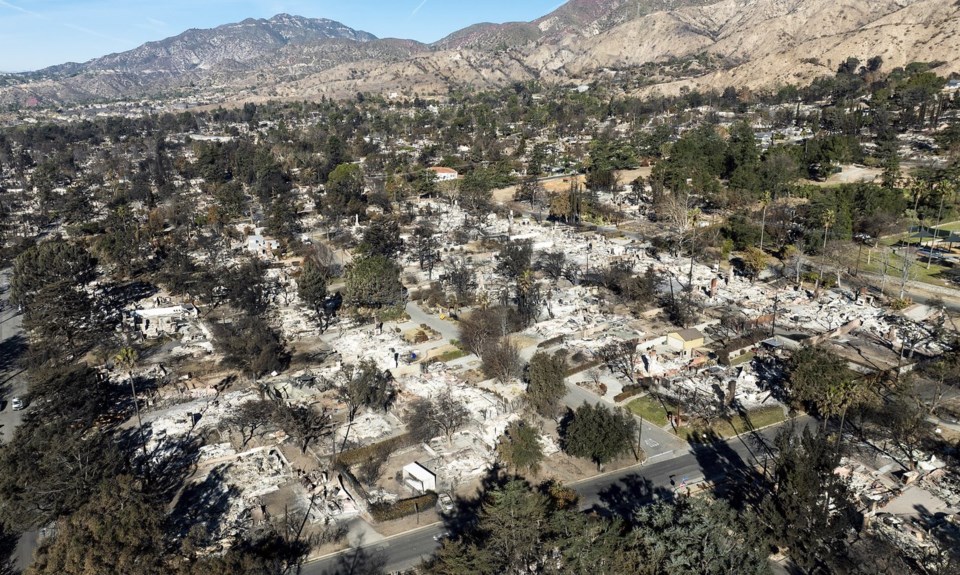SACRAMENTO, Calif. (AP) — California’s plan that provides insurance to homeowners who can’t get private coverage needs $1 billion more to pay out claims related to the Los Angeles wildfires, the state Insurance Department said Tuesday.
The FAIR Plan is an insurance pool that all the major private insurers pay into, and the plan then issues policies to people who can’t get private insurance because their properties are deemed too risky to insure. The plan, with high premiums and basic coverage, is designed as a temporary option until homeowners can find permanent coverage, but more Californians are relying on it than ever. There were more than 452,000 policies on the Fair Plan in 2024, more than double the number in 2020.
The plan says it's expecting a loss of roughly $4 billion from the Eaton and Palisades Fires, which sparked Jan. 7, destroyed nearly 17,000 structures and killed at least 29 people. Roughly 4,700 claims have been filed as of this week, and the plan has already paid out more than $914 million.
Under a FAIR Plan request approved by the state Tuesday, all insurers doing business in California will have to bear half the cost and can pass on the rest to all policyholders in the form of a one-time fee. Insurers can collect that cost in the next two years. The state Insurance Department must approve those costs.
State officials didn't immediately have details on how large the fee would be. In approving the request, the state allowed the plan to send out notices and collect funding from marketplace insurers within 30 days.
It’s the first time the Fair Plan has sought approval for additional money in more than 30 years, the department said.
“I took this necessary consumer protection action with one goal in mind: the FAIR Plan must pay claims just like any other insurance company,” Insurance Commissioner Ricardo Lara said in a statement.
“I reject those who are hoping for the failure of our insurance market by spreading fear and doubt," Lara said. "Wildfire survivors can’t cash ‘what ifs’ to pay for food and rent, but they can cash FAIR Plan checks.”
The plan also expects to receive $1.45 billion in reinsurance to help pay out claims. It anticipates it will have roughly $400 million left by July.
According to the plan, 45% of the wildfire claims filed so far are reported as total losses, 45% as partial losses and 10% as fair rental value.
Insurers on Tuesday said they’re committed to helping the recovery process after the fires and that the ability to recoup some of the cost from ratepayers will prevent companies from leaving the state.
“This is essential to prevent even greater strain on California’s already unbalanced insurance market and avoiding widespread policy cancellations that would jeopardize coverage for millions of Californians,” said Mark Sektnan of the American Property Casualty Insurance Association, the largest national trade association for home, auto and business insurers.
But a consumer watchdog group, which opposed a rule that allows insurers to pass off costs to policyholders, said it will challenge the effort.
"Consumer Watchdog is exploring every legal option to stop a bailout if any insurance company seeks to make consumers pay,” Carmen Balber, executive director of Consumer Watchdog, said in a statement.
California is undergoing a yearslong effort to stabilize its insurance market after several major insurance companies either paused or restricted new business in the state in 2023, which pushed hundreds of thousands of homeowners onto the FAIR Plan. Wildfires are becoming more common and destructive in California due to climate change, and insurers say that’s making it difficult to truly price the risk on properties.
Of the top 20 most destructive wildfires in state history, 15 have occurred since 2015, according to the California Department of Forestry and Fire Protection.
The state now gives insurers more latitude to raise premiums in exchange for issuing more policies in high-risk areas. That includes regulations allowing insurers to consider climate change when setting their prices and allowing them pass on the costs of reinsurance to California consumers.
Trân Nguyễn, The Associated Press



